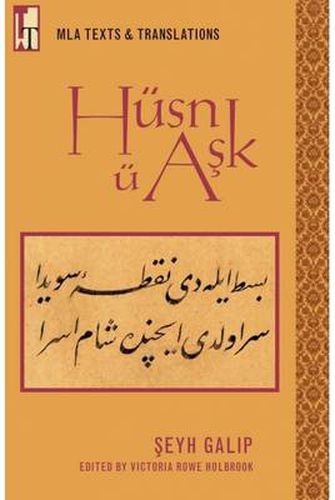Readings Newsletter
Become a Readings Member to make your shopping experience even easier.
Sign in or sign up for free!
You’re not far away from qualifying for FREE standard shipping within Australia
You’ve qualified for FREE standard shipping within Australia
The cart is loading…






The girl Husn and the boy Ask are betrothed to each other as children. But Husn violates the custom of the tribe by falling in love with him, and Ask must undergo the trials of a journey to the Diyar-i Kalp, Land of the Heart, to prove himself worthy-a journey to realization of both his and Husn’s true nature.
The Turkish verse romance Husn u Ask, written in 1783 by Seyh Galip, head of an Istanbul center of Rumi’s order of the Whirling Dervishes, is an innovative interpretation of the Islamic love tale as a story of the action of God’s qualities in the world. With its stunning imagery, fast-moving plot, and nonchalant, erudite humor, it is widely known as the greatest work of Ottoman literature.
In her introduction Victoria Rowe Holbrook discusses the heritage of Ibn Arabi and Rumi in Ottoman thought, the traditions of verse romance and allegory, Indian style imagery, and Galip’s political loyalties.
$9.00 standard shipping within Australia
FREE standard shipping within Australia for orders over $100.00
Express & International shipping calculated at checkout
The girl Husn and the boy Ask are betrothed to each other as children. But Husn violates the custom of the tribe by falling in love with him, and Ask must undergo the trials of a journey to the Diyar-i Kalp, Land of the Heart, to prove himself worthy-a journey to realization of both his and Husn’s true nature.
The Turkish verse romance Husn u Ask, written in 1783 by Seyh Galip, head of an Istanbul center of Rumi’s order of the Whirling Dervishes, is an innovative interpretation of the Islamic love tale as a story of the action of God’s qualities in the world. With its stunning imagery, fast-moving plot, and nonchalant, erudite humor, it is widely known as the greatest work of Ottoman literature.
In her introduction Victoria Rowe Holbrook discusses the heritage of Ibn Arabi and Rumi in Ottoman thought, the traditions of verse romance and allegory, Indian style imagery, and Galip’s political loyalties.